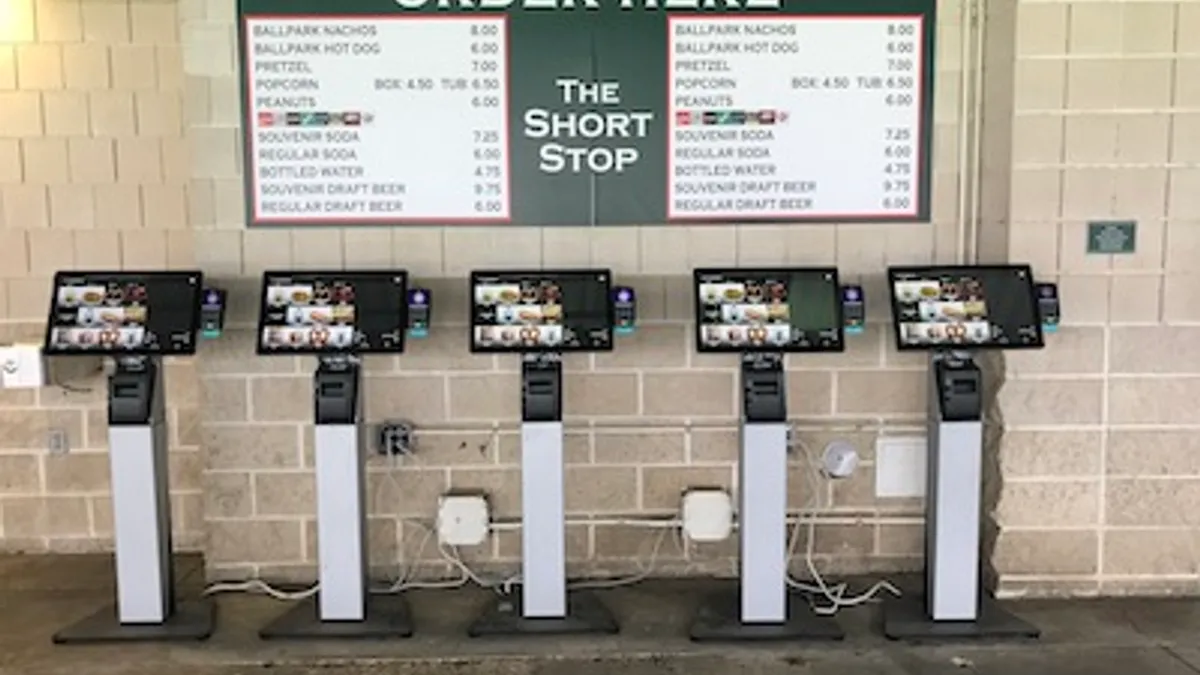Dive Insight:
-
Appetize Technologies, a cloud-based software company that enables mobile ordering and contactless payment options, has partnered with 5 new Major League Baseball and 10 new Minor League Baseball stadiums. Fenway Park in Boston; Dodger Stadium in Los Angeles; Progressive Field in Cleveland; Busch Stadium in St. Louis; and Globe Life Field in Arlington, Texas are the new MLB stadiums using Appetize’s payment channels such as point-of-sale (POS) terminals, self-service kiosks and handheld devices.
-
Since the opening day of the baseball season last month, only 3% of transactions on the Appetize platform were cash across MLB stadiums. Nearly 80% of MLB stadiums that leverage Appetize’s products and services are running on cashless orders and payment channels to provide attendees’ convenience and safety.
-
The popularity of QR codes is a trend the enterprise software company has observed since the start of the COVID-19 pandemic last year. “We all felt like QR codes were sort of a technology of the past, but they made a roaring comeback in the last 12 months, as it really is the easiest way to be able to communicate something online to somebody, by just scanning a picture of a QR code and being taken to a mobile website,” Appetize Chief Strategy Officer Kevin Anderson said.
Dive Brief:
As fans make their way back to stadiums to enjoy live sporting events, stadiums are ramping up their touch-free food, beverage and apparel ordering options so purchasing can be done on phones and at self-service kiosks. Those alternatives to waiting in line at a concession stand also provide the benefit of increasing cashless transactions to provide convenience and safety to attendees amid the ongoing COVID-19 pandemic.
Appetize Technologies, which provides software as well as equipment for the stadium sales, partnered for the first time this season with 5 additional major league and 10 additional minor league stadiums to digitize their ordering and payments functions, the company said in a press release. Some of its new minor league customers are Yankee Stadium in New York; PNC Park in Pittsburgh; Coors Field in Denver; and Comerica Park in Detroit.
That was a significant expansion for Appetize, which now works with a roster of 15 major league and 27 minor league ballparks. The company first launched its services a decade ago in 2011.
“With the mandates that were in place for mobile ordering with delivery and pick-up only and a short window to implement this system, Appetize stepped up to the plate and got us the necessary hardware and training needed to ensure our success,” Corey Brandt, Sutter Health Park's vice president for ballpark experience at the home of the Sacramento River Cats, said in the April 27 press release by Appetize.
COVID-19 is highly contagious and health officials have stressed taking steps to prevent its spread through contactless commerce. Appetize's customer base grew by nearly 85% in 2020 over 2019, Appetize's Anderson said. Contactless mobile ordering and payments gateways grew as businesses tried to offer safer alternatives during the pandemic, he added.
The Los Angeles-based company provides its point-of-sale hardware and inventory management software to the sports entertainment, higher education, food service, and retail industries. It targets enterprises that have at least 20 locations, or a need for 50 point-of-sale devices.
“Our mobile web product became one of our most popular products where guests could scan a QR code and order on their phones via mobile web,” Anderson told Payments Dive. “I would say a trend that we saw was actually to go away from mobile apps, and to go more towards mobile web.”
The comeback of QR codes increased use of mobile web orders and payments, Anderson said. The ease of “just scanning a picture of a QR code and being taken to a mobile website,” helped many businesses process orders without having to build an app for online and mobile orders.
The pandemic increased online food delivery as people stayed indoors to order food. In 2020, the global online food delivery market’s revenue jumped by 27% year-over-year, reaching $136.4 billion compared to $107.4 billion in 2019, according to Stockapp and Statistica.com. The market is expected to grow to $182.3 billion by 2024.











